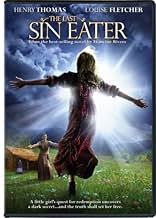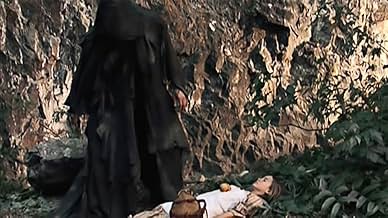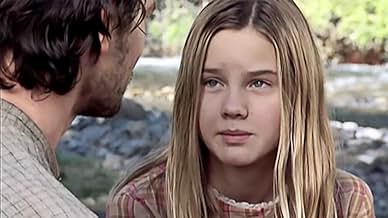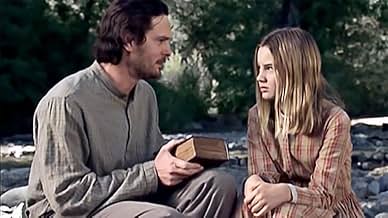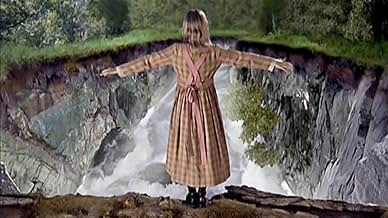IMDb RATING
5.7/10
2.1K
YOUR RATING
In seeking her own redemption from the man of whom she is most afraid, ten-year-old Cadi Forbes discovers a secret sin haunting her community of Welsh immigrants in 1850s Appalachia.In seeking her own redemption from the man of whom she is most afraid, ten-year-old Cadi Forbes discovers a secret sin haunting her community of Welsh immigrants in 1850s Appalachia.In seeking her own redemption from the man of whom she is most afraid, ten-year-old Cadi Forbes discovers a secret sin haunting her community of Welsh immigrants in 1850s Appalachia.
- Director
- Writers
- Stars
- Awards
- 1 win total
- Director
- Writers
- All cast & crew
- Production, box office & more at IMDbPro
Featured reviews
This is a good film to watch. Although it has the low-budget feeling, it promotes a good message. It passes a good message, and shows a twist on traditional practices. Not your average movie, that contains sex or gore. The slow developing plot took a little bit to even figure out what the movie was about. The accents are a little off, i agree to that. But who honestly knows what the accents where back then. When everyone was moving west, it was a major culture collision. The only thing I would have changed was a more developing plot towards the ending. "The Dark Secret," didn't even come into play till the last minutes. No reference point what-so-ever to what it was actually was.
I saw a pre-screening for "The Last Sin Easter" land it is a wonderful movie. The location was beautiful and the acting was outstanding especially by Liana Liberato as well as Soren Fulton. Liana was amazing as Cadi Forbes. Other standouts: Stewart Finlay-McLennan was excellent and brought a lot of energy and ferocity to his role as the tyrant of the cove, Brogan Kai, and Henry Thomas was very good as the kind, sympathetic Man of God. Actually, all the actors did a very nice job. Plus, Brian Bird did a phenomenal job of orchestrating the essential, intricate plot and back-stories of the book into a movie script. The directing was good as well.
A book character, Cadi's brother, was left out completely and the emphasis on the other "bad" Kai boys was also left out too but it is understandable that it was necessary in order to give more time to the main characters and their actions. The identity of Miz Elda (Louise Fletcher) and her relationship to Iona Kai and her friendship with Granny Forbes was not brought to light either but it wasn't necessary to understand that each child, Cadi and Fagan, had a trusting friendship with this woman. Gervase O'Dara's character was not as prominent as in the book, but, again a necessary omission for the time constraints of a movie. Therefore, I feel those out there who, like me, read and enjoyed the book, will not be disappointed at all (as sometimes happens with books being made into movies) because, as stated before, Brian Bird did an outstanding job of conveying the most important aspects and scenes of the book into the movie script. I highly recommend this movie, as it is certainly complementary of the book.
Not to give away the ending but things were only very slightly changed from what I recall of the book and not quite as harsh. I liked the ending a lot but would have enjoyed a little longer monologue from Cadi telling us more of what happened to the cove and some of the people, but it still tied things together very nicely and was beautifully done.
Although the movie does not leave you cheering, laughing or weeping it does have you leaving the theater very hopeful and satisfied as well as a bit contemplative. Jesus is given credit for being the true, original sin eater yet, for non-Christians, the movie is not preachy. It is a lovely movie and would be a good addition, when it comes out on DVD, to anyone's home library. Congratulations to all those who were involved from the grippers, make-up artists, drivers, and the other crewmembers to the cast, writers, producers and director.
A book character, Cadi's brother, was left out completely and the emphasis on the other "bad" Kai boys was also left out too but it is understandable that it was necessary in order to give more time to the main characters and their actions. The identity of Miz Elda (Louise Fletcher) and her relationship to Iona Kai and her friendship with Granny Forbes was not brought to light either but it wasn't necessary to understand that each child, Cadi and Fagan, had a trusting friendship with this woman. Gervase O'Dara's character was not as prominent as in the book, but, again a necessary omission for the time constraints of a movie. Therefore, I feel those out there who, like me, read and enjoyed the book, will not be disappointed at all (as sometimes happens with books being made into movies) because, as stated before, Brian Bird did an outstanding job of conveying the most important aspects and scenes of the book into the movie script. I highly recommend this movie, as it is certainly complementary of the book.
Not to give away the ending but things were only very slightly changed from what I recall of the book and not quite as harsh. I liked the ending a lot but would have enjoyed a little longer monologue from Cadi telling us more of what happened to the cove and some of the people, but it still tied things together very nicely and was beautifully done.
Although the movie does not leave you cheering, laughing or weeping it does have you leaving the theater very hopeful and satisfied as well as a bit contemplative. Jesus is given credit for being the true, original sin eater yet, for non-Christians, the movie is not preachy. It is a lovely movie and would be a good addition, when it comes out on DVD, to anyone's home library. Congratulations to all those who were involved from the grippers, make-up artists, drivers, and the other crewmembers to the cast, writers, producers and director.
I watch these missionary films from time to time. There is an earnestness in most of them that makes up for the fact that they are so horrible.
In my city is Pat Robertson's film school, training hundreds of people a year to make these things. I often wonder what will happen when they actually are able to make good movies?
I am beginning to believe that this may never happen. Film may be making Christianity obsolete. I know this may sound strange. Cinema seems profoundly malleable, a vehicle for any story. And Christianity has survived by adapting far, far from what Jesus believed, making any necessary compromise.
But film has rather rigid dynamics when combined with the forces of how we define ourselves through stories. It is extremely flexible, but only within a conceptual marketplace where the collective projections of self reinforce each other. Cinema allows us to define our own cosmos. It worries me that the rivers are sometimes so banal, but such the way of the collective — and young imaginations have surprising sophistication.
Christianity on the other hand is about accepting a prefabricated story. Well, different ones depending on the preacher's agenda, but the cosmos is defined in a very top down manner. Theoretically, they could overlap a lot, but that is not what the world seems to want. Even the most obvious Jesus stories like Harry Potter don't follow the rules of the Christian institution.
This film has prompted me to believe that it may be impossible to make powerful cinema with the existing dogma. Everything about it fails.
The irony is that the story flows are about rigid superstition being made obsolete, not by the Bible in the story, but because people simply want to explain for themselves what the world is.
Ted's Evaluation -- 1 of 3: You can find something better to do with this part of your life.
In my city is Pat Robertson's film school, training hundreds of people a year to make these things. I often wonder what will happen when they actually are able to make good movies?
I am beginning to believe that this may never happen. Film may be making Christianity obsolete. I know this may sound strange. Cinema seems profoundly malleable, a vehicle for any story. And Christianity has survived by adapting far, far from what Jesus believed, making any necessary compromise.
But film has rather rigid dynamics when combined with the forces of how we define ourselves through stories. It is extremely flexible, but only within a conceptual marketplace where the collective projections of self reinforce each other. Cinema allows us to define our own cosmos. It worries me that the rivers are sometimes so banal, but such the way of the collective — and young imaginations have surprising sophistication.
Christianity on the other hand is about accepting a prefabricated story. Well, different ones depending on the preacher's agenda, but the cosmos is defined in a very top down manner. Theoretically, they could overlap a lot, but that is not what the world seems to want. Even the most obvious Jesus stories like Harry Potter don't follow the rules of the Christian institution.
This film has prompted me to believe that it may be impossible to make powerful cinema with the existing dogma. Everything about it fails.
The irony is that the story flows are about rigid superstition being made obsolete, not by the Bible in the story, but because people simply want to explain for themselves what the world is.
Ted's Evaluation -- 1 of 3: You can find something better to do with this part of your life.
First off the budget is small so be kind. Its a pretty solid story although it probably could have been fleshed out and feels a little disjointed in places. It is still a solid film and an excellent addition for fans of Christian films, unlike many Christian films it does not whitewash its message.
The best part of the film is the performance of Peter Wingfield as the Sin Eater. While he is almost a minor character as far as screen time his performance makes the film. His voice is so sorrowful in his scenes (he is hidden for the majority of the movie) that you could just sob for him. His pathos is spot on. He is not overly dramatic but succeeds in selling the believability of the film.
The best part of the film is the performance of Peter Wingfield as the Sin Eater. While he is almost a minor character as far as screen time his performance makes the film. His voice is so sorrowful in his scenes (he is hidden for the majority of the movie) that you could just sob for him. His pathos is spot on. He is not overly dramatic but succeeds in selling the believability of the film.
This is a film that requires some willing suspension of disbelief, since its makers seem possibly to be prey to the fallacy that it enough that Christian art be Christian. Which is not to say that they didn't get most of it right, just that their missteps are so avoidable. Fortunately, most (like the young star's unbelievably sumptuous wardrobe) weren't major distractions for me. But the crudeness of the special effects scenes (which, thankfully, are brief) did disrupt my experience, as I wondered, "What were they thinking that this looked right to them?"
Most of the cast does a truly fine job, with all the central characters (the Forbes family and Fagan Kai) getting moving, heartfelt and convincing performances from their players. There's a relationship here between quantity of screen time and quality, so the minor characters remain pretty two-dimensional, though not distractingly so.
The cinematography (except for special effects, as noted) is beautiful and effective, and successfully evokes the feeling of confining, dense Appalachian woods and isolation.
Bottom line: despite its minor shortcomings, this is an effective, affecting, non-preachy and original retelling of one of the central concepts of Christianity.
Most of the cast does a truly fine job, with all the central characters (the Forbes family and Fagan Kai) getting moving, heartfelt and convincing performances from their players. There's a relationship here between quantity of screen time and quality, so the minor characters remain pretty two-dimensional, though not distractingly so.
The cinematography (except for special effects, as noted) is beautiful and effective, and successfully evokes the feeling of confining, dense Appalachian woods and isolation.
Bottom line: despite its minor shortcomings, this is an effective, affecting, non-preachy and original retelling of one of the central concepts of Christianity.
Did you know
- TriviaLiana Liberato's debut.
- GoofsContrary to what is shown with the immigrant Welsh as superstitious pagans, the Welsh of the early 1800s had a strong Christian background, with the Church of England and an early Methodist movement being the most common denominations. Christianity, the bible, and Jesus would have been well known to anyone from Wales.
- How long is The Last Sin Eater?Powered by Alexa
Details
- Release date
- Country of origin
- Language
- Also known as
- El último devorador de pecados
- Filming locations
- Production companies
- See more company credits at IMDbPro
Box office
- Budget
- $2,200,000 (estimated)
- Gross US & Canada
- $388,390
- Opening weekend US & Canada
- $245,000
- Feb 11, 2007
- Gross worldwide
- $388,390
- Runtime
- 1h 57m(117 min)
- Color
- Sound mix
- Aspect ratio
- 1.85 : 1
Contribute to this page
Suggest an edit or add missing content



